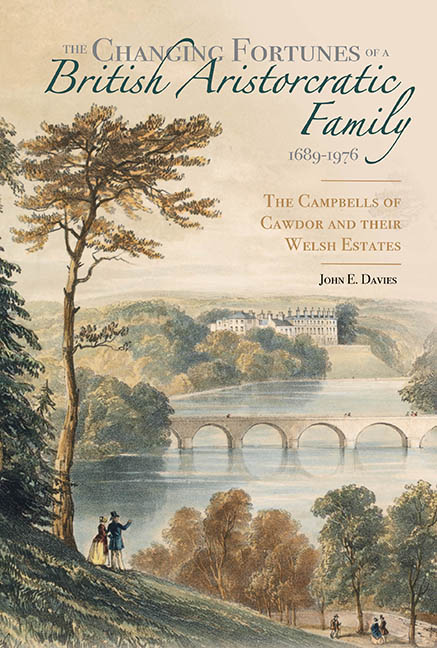 The Changing Fortunes of a British Aristocratic Family, 1689–1976
The Changing Fortunes of a British Aristocratic Family, 1689–1976 Book contents
- Frontmatter
- Contents
- List of Illustrations
- Acknowledgements
- List of Abbreviations
- Pedigree
- Introduction
- 1 Cawdor and Campbell
- 2 Estate Administration
- 3 The Agricultural Estate: The Cawdors as Farmers and Landlords
- 4 The Cawdors as Industrial Landowners
- 5 The Cawdors in the Community: Church and Education
- 6 The Mêlée of Local Governance
- 7 The Cawdors in Politics: Interest Building, Consolidation and Decline
- 8 Private and Exclusive Lives
- 9 The End of the Welsh Estates
- Conclusion
- Bibliography
- Index
9 - The End of the Welsh Estates
Published online by Cambridge University Press: 21 March 2020
- Frontmatter
- Contents
- List of Illustrations
- Acknowledgements
- List of Abbreviations
- Pedigree
- Introduction
- 1 Cawdor and Campbell
- 2 Estate Administration
- 3 The Agricultural Estate: The Cawdors as Farmers and Landlords
- 4 The Cawdors as Industrial Landowners
- 5 The Cawdors in the Community: Church and Education
- 6 The Mêlée of Local Governance
- 7 The Cawdors in Politics: Interest Building, Consolidation and Decline
- 8 Private and Exclusive Lives
- 9 The End of the Welsh Estates
- Conclusion
- Bibliography
- Index
Summary
From the last quarter of the nineteenth century, as quasi-democratic forces began to exert themselves, the cosy lifestyle enjoyed by the elite minority came increasing under threat, even from the mostly Conservative governments and that mainly conservative body, the House of Commons. Private land as a wealth-creating possession began to be seen by governments as a source to be tapped in their search for additional revenue with which to finance an expanding social policy, which was increasingly expected by a hugely increased electorate. The overwhelming influence of aristocratic landowners had been cauterised by the Local Government Acts of 1888 and 1894, though it is surprising just how many landowners continued to serve on the new county councils – at least in the short term. The depression in agriculture, which had been blighting the rural landscape since around 1880, showed no signs of relenting. It steadily eroded the income from land, though initially some of the larger landowners, including the Cawdors, seemed to be unconcerned. The Cawdors continued to buy and sell as they had always done: between 1882 and 1891 Carmarthenshire land purchases, including £11,000 for an entire small estate, amounted to £17,994, while sales for the years 1887–94 totalled £8,127.
Agricultural depression apart, it has been seen that other antagonisms entered the arena to disturb the landowners’ paternalist world. Agitation for land reform, originating in Ireland, was increasingly strident in both Scotland and Wales. In 1894, the same year parish councils came into being, with their largely democratically elected councillors, Sir William Harcourt, the Liberal Chancellor of the Exchequer, introduced an estate or death duty of 8 per cent. Although it initially only applied to estates worth one million or more, Harcourt’s Act was seen as an indication of the future and fuelled the increasingly pessimistic outlook. The reaction of the Cawdor family after the death of the second earl in 1898 was repeated by other landed families hit by death duties: they contemplated closing Golden Grove mansion completely. Twelve years later, Lloyd George's proposed land valuation and tax of 20 per cent on land indicated to many estate owners nothing but a bleak future. In March 1910 Lloyd George stated that ‘The political power of landlordism was shattered as effectively as the power of the Druids’, which, although hyperbole, added to the gloom.
- Type
- Chapter
- Information
- The Changing Fortunes of a British Aristocratic Family, 1689–1976The Campbells of Cawdor and their Welsh Estates, pp. 289 - 297Publisher: Boydell & BrewerPrint publication year: 2020
